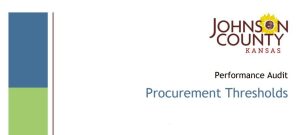The first page of a recent audit of purchasing controls in Johnson County government shows a startling lack of oversight.
According to the report — presented at the Sept. 5, 2024, Johnson County Commission Meeting — new purchasing guidelines designed to reduce costs, speed purchases, and simplify purchase procedures have resulted in a process where those cost reductions cannot be quantified, and purchase orders are being created after the fact.
 “We couldn’t quantify the total reduction in costs due to difficulty identifying contract amounts systematically,” the report reads. “Data were not sufficiently reliable to identify all contracts and contract amounts consistently. County purchase orders were often created after receiving an invoice from a supplier while the designed process is to create purchase orders before receiving an invoice. The process is designed to control spending and encourage responsible use of funds; reduce risk and prevent potential fraud; and provide documentation for financial review and audits.”
“We couldn’t quantify the total reduction in costs due to difficulty identifying contract amounts systematically,” the report reads. “Data were not sufficiently reliable to identify all contracts and contract amounts consistently. County purchase orders were often created after receiving an invoice from a supplier while the designed process is to create purchase orders before receiving an invoice. The process is designed to control spending and encourage responsible use of funds; reduce risk and prevent potential fraud; and provide documentation for financial review and audits.”
“This is like our kids using our credit card without our knowledge and then informing us of the necessity after we receive the bill,” Johnson County Commissioner Charlotte O’Hara said in an emailed statement. “We, the people, are required to balance our checkbooks, but the county has a siphon into our bank accounts, so when they need more money, they raise our taxes.”
Purchase orders are supposed to be issued by employees authorized to make financial commitments, sent to the accounting department, and matched to invoices to certify that the invoices are valid. A breakdown in the purchase order system can result in the accounting department paying for unauthorized purchases.
The audit noted this has been an ongoing issue.
“County purchase orders were sometimes created after receiving an invoice from a supplier while the designed process is to create purchase orders before receiving an invoice,’ the report reads. “For the period of January 2023 to March 2024, about 80 percent of purchase orders were created after the County received an invoice for payment. We noted the issue while assessing the reliability of data on contracts. The February 2020 Contract Administration Audit noted a similar issue.”
The report also noted that “users” may have been circumventing the process out of convenience.
“They save time by waiting to receive an invoice before creating the associated documentation in Oracle,” the report reads. “This reduces the need to make any corrections to documents that should have been created earlier. It reduces the workload for making changes and expedites the process of making payments to suppliers. It also reduces the effectiveness of the controls as designed.”
As both O’Hara and the auditors noted, there are also issues connecting the Oracle system, which tracks contracts and purchase orders, and the IonWave portal, where vendors respond to requests for proposals.
“Our ION system, the portal for vendors to respond to RFPs, and our Oracle system through which the county makes payments are not integrated,” O’Hara said. “Purchase order codes, if there is a purchase order, must be manually transferred from Ion to Oracle with multiple opportunities for error.”
The county auditors agreed.
“Current data doesn’t allow for a consistent identification of contract values,” the report reads, adding: “Using two software systems (IonWave for contracts and Oracle for payments) makes consistent tracking more complicated. While the systems aren’t linked, the Purchasing Division trains users on how to look up contract information in IonWave and enter it into payments in the Oracle financial system. Incomplete data may require manual processes for accurate reports or analysis.”
Johnson County Commission Chair Mike Kelly rejects concern for taxpayers’ money
Ultimately, the Johnson County audit department stated they could not even find all of the contracts that should be in the system.
“We determined that the data were not sufficiently reliable to identify all contracts and contract amounts consistently,” the report reads. “This meant we couldn’t fully answer our audit question.”
The new procedures allow for purchases under $15,000 to be made “on the open market” without a competitive process and with only approval by a manager.
Anything between $15,000 and $75,000 requires written quotes from multiple firms or bids; does not require public notice; and the purchasing division will validate quotes and issue informal bids.
Between $75,000 and $150,000 requires formal bids or requests for proposals; both require public notice and at least 10 workdays for responses — and must be approved by a department head or county manager.
Any purchase of $150,000 and up now requires formal bids or requests for proposals, which require public notice and at least 10 workdays for responses and approval by the Board of County Commissioners.
When O’Hara raised concerns about the audit and unauthorized spending at the commissioner meeting, Johnson County Commission Chair Mike Kelly rudely accused her of “looking for a sound bite.” Kelly controls a 5-2 majority among commissioners and routinely sides with county staff over taxpayers.


